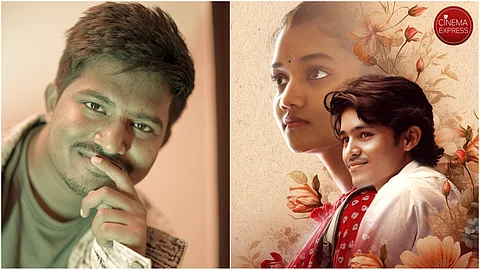

When the 2018 film ’96 released, Singara Mohan remembers feeling a twinge of pain and jealousy. The Trisha-Vijay Sethupathi starrer has themes of nostalgia, first love and longing that are similar to a script he was working on then. Nearly seven years later, Mohan is ready with his debut feature, Kaalamega Karigindhi..? The filmmaker is confident of offering something new, despite playing on similar ideas as in ’96. “I believe I have explored some aspects ’96 didn’t. I also hope to offer a different screenplay structure,” says the debutant filmmaker.
Talking further about the origins of his story, Mohan adds, “I wanted to make a film without a big conflict point, to do something with completely innocent sensibilities, no negative emotion, no action sequences. I also had an ambition to bring Telugu poetry into the mainstream. The element of school nostalgia too was always on my mind — that’s how the idea for Kaalamega Karigindhi..? came into place.”
The director talks about the use of poetic language as the highlight of his film. Recalling his school days when the reading bug first bit him, Mohan says that it was a conscious choice to keep the dialogues in a poetic style for Kaalamega Karigindhi..? At the same time, Mohan reassures that the language will not be alien to the audience. The director feels that art forms like literature or cinema can play a major role towards saving the cultural significance of a language. “There are no new words used in my film; it’s the way the sentences are formed that will sound fresh. When I see Gen Z speaking fluent, sophisticated English, I wonder why our films can’t have similarly fluent Telugu,” he says.
While pursuing his graduation studies, Mohan founded an edutech start-up in 2018 named Vector Academy, which designed multimedia-driven courses for schools. It was in this period that he began making short films and educating himself on the process of filmmaking. One of the short films he made, A Date in the Dark, was selected for over 50 film festivals across the globe. The filmmaker candidly recalls the journey, mentioning that there are many other short films lying on his computer, which he never released or submitted for festivals. He explains, “I consciously self-evaluate my work and look for mistakes in my films. Unless I feel I have achieved my best and my film has no mistakes, I can’t release it.” It was also during this period that Mohan met many other technicians and created a team to pursue his independent film project, which has now found a shape in Kaalamega Karigindhi..?
The writer-director also opens up about why he never worked as an assistant director before pursuing directing on his own. He explains, “I am an introvert by nature, and I never had the confidence to impress stars or producers with my narration. Around 2016, when I finished my intermediate studies, I thought of doing rounds of filmmakers’ offices. But no matter what you do, they will see you as kids. This was the phase when I decided to go down the indie route. My brother is the producer for this film; it’s him and some friends who provided the funding.”
While the story of Kaalamega Karigindhi..? is entirely fictional, Mohan shares that he was particular about its visual references, where he wanted to recreate his school day memories. The filmmaker adds, “I showed those frames to my team to create that aura and ambience from my school surroundings. I wrote the blocking for my scenes keeping those visuals in mind, where even a verandah has to look in a particular way. We tried our best to match those visuals.” As a debutant feature filmmaker, Mohan admits that it was challenging to earn his team’s trust for the first few days. He states, “I realised the toughest part of filmmaking is to convey the exact vision you have in your mind to your team. It took some time to reach that point of clear communication.” The director also recalls how he and his team did extensive prep work before going to sets to avoid time wastage, adding, “If we had to shoot for two days, it was a month of prep. We finished the shoot in 18 days, that way.”
Talking about the role of cinema in shaping societal values, Mohan adds, “The way we talk or use body language, we try to imitate what we watch in movies. We absorb these things subconsciously.” The director, however, notes how violence in most contemporary movies feels arbitrary and out of context, stating, “Even if a film is set in the present, you will see people slashing people with swords on streets. If violence has to be shown in movies, it must have a cause.” Further asserting why such a powerful medium can be used more productively, Mohan notes, “When one sees violence in society, one feels maybe cinema is actually impacting us that deeply. So if the audience is absorbing violent or massy films, maybe they will absorb poetry too — if we portray it the right way. Poetic cinema can be as impactful as massy cinema. Innocent sensibilities are what the audience needs the most right now.”
Singara Mohan says he intends to ‘bring art cinema to mainstream.’ He elaborates, “My major aim is to make art cinema commerce-friendly, to attempt experimental ideas that could work at the box office.” Mohan mentions that he is working on another story idea, which too will have a poetic touch and smaller conflicts. “It will have no violence, though,” Mohan adds smilingly.